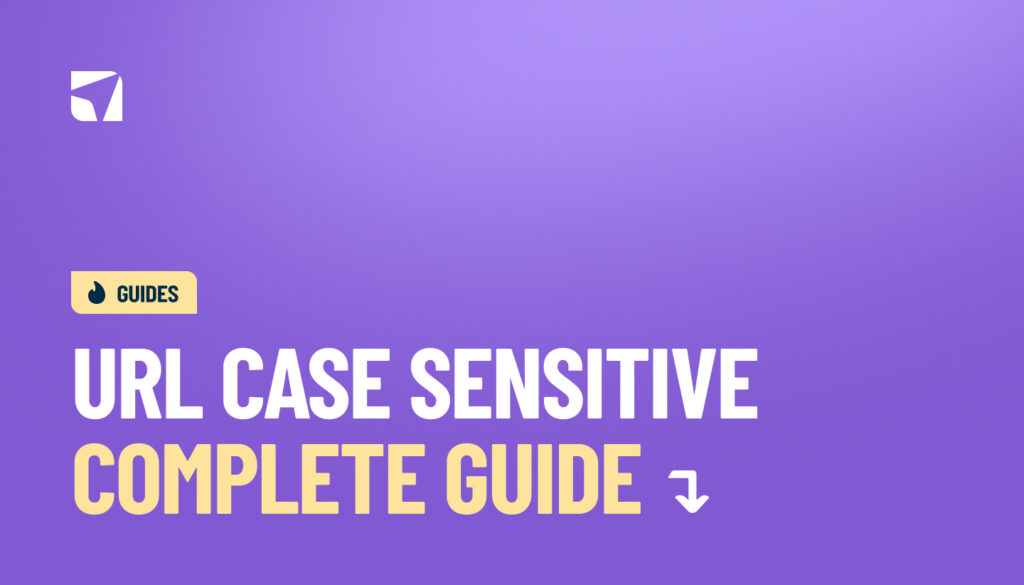Think about it this way: when your website has URLs with different capitalisation leading to the same content, Google treats them as completely separate pages.
You’re essentially creating duplicate content issues that hurt your ranking potential while splitting your link equity across multiple URL versions.
Here’s where it gets interesting. Not every part of a URL structure follows the same rules. Some components are always case-sensitive, while others aren’t. Most Australian business owners don’t realise that this technical fact has been part of URL design from the beginning.
So are website URLs case sensitive across all platforms?
Not consistently.
Different web servers and content management systems handle capitalisation in their own way. Despite what many believe, URLs aren’t always case sensitive in every part, nor are they completely case-insensitive either.
That’s exactly why implementing proper URL case standards matters for preventing SEO problems like 404 error pages and keeping your website performance consistent.
The good news?
Once you understand these distinctions, fixing URL case issues becomes much more straightforward.
Which Parts of a URL Are Case Sensitive?
Breaking down URL case sensitivity means looking at each component separately. Different parts follow completely different capitalisation rules, and this directly affects how web servers interpret your requests.
Scheme and host: always case-insensitive
The good news starts here. The first components of any URL – the scheme (http/https) and the host part (domain name) – are always case-insensitive across every server and system. They work the same regardless of capitalisation.
According to RFC 3986 standards, “scheme and host are case-insensitive and therefore should be normalised to lowercase.” What does this mean practically? HTTPS://WWW.EXAMPLE.COM and https://www.example.com are functionally identical because these components get automatically normalised.
Note: Lowercase versions are still preferred for consistency and readability purposes.
Path and file names: case-sensitive on most web servers
This is where things get complicated. The path portion of your URL (everything after the domain name but before any question mark or hash symbol) behaves differently depending on your server’s operating system:
Linux/Unix web servers treat paths as strictly case-sensitive. /About and /about represent completely different resources on these systems. Get the capitalisation wrong and you’ll serve a 404 error.
Windows web servers generally ignore case differences because the underlying file system treats /About and /about as the same page.
Why this difference? Unix systems were designed to treat uppercase and lowercase as distinct characters, while Windows maintained case-insensitivity partly due to its DOS heritage, which originally didn’t support lowercase letters.
Query parameters and fragments: often case-sensitive
The final URL components, query parameters (after the ? symbol) and fragments (after the # symbol), follow their own rules:
- Query parameter names are typically case-sensitive. ?id=123 and ?ID=123 may produce different results depending on your server configuration.
- Query parameter values are almost always case-sensitive. The value ?search=Apple is completely distinct from ?search=apple.
- Fragment identifiers (after the # symbol) are also case-sensitive, though browsers handle their interpretation rather than web servers.
These distinctions aren’t just technical details. They have real implications for your website functionality and SEO performance. How different content management systems handle these variations can complicate matters further, especially when moving between platforms or server environments.
Why URL Case Sensitivity Matters for SEO
The technical details are one thing. The business impact is another entirely. URL case sensitivity creates real SEO problems that can quietly damage your search rankings and user experience.
Duplicate content from mixed-case URLs
Google sees /about-us and /About-Us as two completely different pages, even when they show identical content. This creates a classic duplicate content scenario where your ranking signals get diluted instead of consolidated.
The result? Search engines struggle to determine which version deserves to rank, potentially leading to indexing discrepancies and downgraded ranking potential for both versions.
404 errors from incorrect casing
Case-sensitive web servers (particularly Linux-based systems) will serve up frustrating 404 errors when users enter URLs with incorrect capitalisation. This commonly happens when links get shared through emails, newsletters, or social media. Someone changes the capitalisation without testing the URL first.
Even worse? During website redesigns, developers might switch from uppercase to lowercase URLs without implementing proper redirects. This breaks every existing link pointing to those pages.
Split link equity and page authority
External sites linking to different capitalisation versions of your URLs scatter the authority and value from those links across multiple variations. Instead of consolidating on a single page, your link equity gets fragmented, directly impacting your ranking potential in search results.
Canonical tags don’t always solve this problem either. Search engines sometimes ignore these directives and continue indexing both versions.
Inconsistent analytics and tracking data
URL case variations appear as entirely separate pages in Google Analytics. Each version maintains its own dataset, making performance analysis unnecessarily complicated.
You’ll miss the complete picture of how pages are actually performing unless you examine metrics across all capitalised variants. This fragmentation makes it challenging to accurately assess user behaviour, conversion rates, and traffic patterns across your site.
How Different Systems Handle URL Casing
Your web server’s operating system determines exactly how URL capitalisation gets processed. This explains why the same URL with different capitalisation might work perfectly on one website but throw a 404 error on another.
Linux vs Windows server behaviour
Most Australian web hosting providers offer both Linux and Windows server options, and your choice directly affects URL case handling.
Linux servers enforce strict case sensitivity by design. On these systems, /About and /about are completely different resources. Users who type the wrong capitalisation will hit a 404 error page, not exactly the user experience you want for potential customers.
Windows servers take the opposite approach. Both /About and /about resolve to the same page because Windows file systems ignore capitalisation differences. While this might seem like a solution, it creates its own problems when you migrate between server environments or work with web development teams using different systems.
CMS defaults: WordPress, Shopify, and others
Popular content management systems add another layer of complexity to URL case handling.
WordPress doesn’t automatically redirect mixed-case URLs to lowercase versions. The system treats /page and /Page As the same resource internally, but the different URLs still appear in your browser address bar. This inconsistency can confuse both users and search engines.
Shopify allows both uppercase and lowercase URLs to be accessible by default. You’ll need to manually ensure only one version gets linked throughout your site to avoid SEO issues.
robots.txt and sitemap case sensitivity
Here’s where many Australian businesses trip up: robots.txt files follow strict case-sensitivity rules. The directive that blocks /blog won’t affect /Blog – search engines treat these as separate paths entirely.
Your XML sitemaps also follow case-sensitivity rules. Google and other search engines process URL capitalisation according to technical standards, which means inconsistent capitalisation requires consistent implementation across your entire SEO configuration.
Best Practices to Avoid Case Sensitivity Issues
Fixing URL case sensitivity issues doesn’t have to be complicated. These proven strategies will protect your site from the SEO problems we’ve just covered.
Use lowercase URLs by default
Make lowercase your standard approach from day one. Users find these URLs easier to type, share, and remember. Plus, they work consistently across all server environments. Search engines prefer this consistency too, which means fewer headaches for your SEO strategy.
Set up 301 redirects for uppercase variants
Already have mixed-case URLs? 301 redirects are your solution. Server configuration files like .htaccess or httpd.conf can automatically redirect uppercase URL variants to their lowercase versions. This preserves your link equity while giving users a consistent experience.
Apply rel=canonical to preferred URLs
Canonical tags tell search engines which URL version you prefer:
<link rel=”canonical” href=”http://www.example.com/about-us” />
This prevents duplicate content issues even when multiple URL variations exist on your site.
Audit internal links and structured data
Check your internal linking structure regularly for inconsistent URL capitalisation. Your structured data must exactly match your canonical URLs. Otherwise, you’re creating confusion for search engines.
Standardise file names and extensions
Keep all files and folders lowercase. This ensures compatibility whether you’re running Linux (case-sensitive) or Windows (case-insensitive) systems.
The key takeaway? Consistency beats perfection. Choose lowercase as your standard and stick with it across your entire website.
Let’s Wrap It Up
URL case sensitivity might seem like a tiny detail, but it can make a big difference to your SEO. Sticking with lowercase URLs and setting up proper redirects keeps your site consistent, your rankings strong, and your user experience seamless.
Want help auditing or fixing your site’s technical setup? Get in touch with our friendly team here at Digital Nomads HQ. Our team of SEO and web specialists are passionate about helping businesses develop solid foundations for their website.
Frequently Asked Questions
Are URLs case sensitive?
Yes, mostly. While the scheme and host (like https:// or your domain) aren’t case sensitive, the path and file names usually are, especially on Linux web servers.
How does URL case sensitivity affect SEO?
Different capitalisations can create duplicate content, 404 errors, and split link equity, all of which can weaken your site’s SEO performance.
What’s the best practice for URL capitalisation?
Always use lowercase URLs. They’re cleaner, easier to share, and help prevent technical and SEO issues.
How do different server systems handle URL casing?
Linux servers are case sensitive, while Windows servers are not. CMS platforms like WordPress and Shopify have their own quirks, so consistency is key.
What steps can I take to avoid URL case sensitivity issues?
Use lowercase URLs, set up 301 redirects, add canonical tags, audit internal links, and keep all file names lowercase.


















